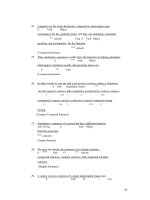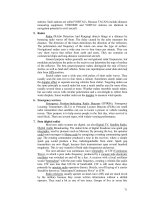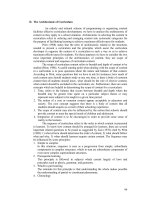Tài liệu Common erros in English part 2 doc
Bạn đang xem bản rút gọn của tài liệu. Xem và tải ngay bản đầy đủ của tài liệu tại đây (409.38 KB, 15 trang )
ADDING
ENDINGS
drop
+ ed =
dropped
flat
+
est = flattest
win + ing
=
winning
sun + *y =
sunny
*y
counts
as a
vowel when
it
sounds like
i or e.
See
VOWELS.
Treat
qu as one
letter:
quit
+ ing =
quitting
quip
+ ed =
quipped
Don't double
final w and x.
They would look
very
odd and so we
have correctly:
tax + ing =
taxing
paw + ed =
pawed
(ii)
The
magic
-e
rule
This
rule applies
to all
words ending with
a
silent
-e.
e.g.
hope, care, achieve, sincere, separate
When
you add an
ending beginning with
a
consonant, keep
the -e:
hope
+
ful
=
hopeful
care
+
less
=
careless
sincere
+
ly
=
sincerely
separate
+ ly =
separately
achieve
+
ment
=
achievement
When
you add an
ending beginning with
a
vowel, drop
the -e:
hope
+ ing =
hoping
care
+ er =
carer
sincere
+ ity
=
sincerity
separate
+ ion =
separation
achieve
+ ed =
achieved
Do,
however, keep
the -e in
words like singeing
(different
from
singing)
and
dyeing
(different
5
ADDING ENDINGS
from
dying)
and
whenever
you
need
to
keep
the
identity
of the
base
word
clear (e.g. shoeing,
canoeing).
Do
remember
to
keep
the -e
with
soft
c and
soft
g
words. It's
the e
that keeps them
soft
(courageous, traceable). (See
SOFT
c
AND
SOFT
G.)
Don't keep
the -e
with these eight exceptions
to the
rule: truly, duly, ninth, argument, wholly,
awful,
whilst, wisdom.
(iii)
-y
rule
This rule applies
to all
words ending
in -y.
Look
at
the
letter before
the -y in the
base word.
It
doesn't matter
at all
what kind
of
ending
you
are
adding. When
you add an
ending
to a
word
ending
in a
vowel
+ y,
keep
the y:
portray
+ ed =
portrayed
employ
+
ment
=
employment
When
you add an
ending
to a
word ending
in a
consonant
+ y,
change
the y to i:
try
+al
=
trial
empty
+ er =
emptier
pity
+
less
=
pitiless
lazy
+
ness
=
laziness
Do
keep
the y
when adding -ing.
Two i's
together would look very odd, despite
our two
words ski-ing
and
taxi-ing.
try + ing
=
trying
empty
+ ing =
emptying
Don't apply
the
rule
in
these fourteen cases:
daily,
gaily, gaiety, laid, paid, said, slain,
babyhood, shyly, shyness, dryness, slyness,
wryly,
wry
ness.
6
ADDING
ENDINGS
(iv)
The
2-1-1 rule
This
rule applies
to:
words
of TWO
syllables
ending with
ONE
consonant
preceded
by ONE
vowel.
With
this rule,
it all
depends
on
which syllable
of
the
word
is
stressed.
The
2-1-1 words below
are
stressed
on the first
syllable,
and
both vowel
and
consonant endings
are
added without
any
complications:
gossip gossiping
target
targeted
limit
limitless
eager eagerness
But
note that
kidnap,
outfit,
worship, always
double their
final
letter:
kidnapped,
outfitter,
worshipping
Take
care with 2-1-1
words
which
are
stressed
on the
second syllable. There
is no
change when
you
add a
consonant ending:
forget
+
fill
=
forgetful
equip
+
ment
=
equipment
Double
the final
consonant
of the
base
word
when
you add a
vowel ending:
forget
+ ing =
forgetting
equip
+ ed =
equipped
forbid
+ en =
forbidden
begin
+ er =
beginner
This
rule
is
really valuable
but you
must
be
aware
of
some exceptions:
2-1-1
words ending
in -1
seem
to
have
a
rule
all
of
their own. Whether
the
stress
is on the first
or the
second syllable, there
is no
change when
7
ADDRESS
a
consonant ending
is
added:
quarrel
+
some
=
quarrelsome
instal
+
ment
=
instalment
Double
the -1
when adding
a
vowel ending:
quarrel
+ ing =
quarrelling
instal
+ ed =
installed
excel
+ ent =
excellent
^
Notice
how the
change
of
stress
in
these
words
affects
the
spelling:
confer
conferred conferring conference
defer
deferred deferring deference
infer
inferred inferring inference
prefer
preferred preferring preference
refer
referred referring reference
transfer
transferred transferring transference
See
also
-ABLE/-IBLE
;
-ANCE,-ANT/-ENCE,-ENT
;
CAL/-CLE
;
-FUL;-LY.
address
(not
adr-)
adieu
(singular) adieus
or
adieux (plural)
See
FOREIGN PLURALS.
adrenalin/adrenaline
Both spellings
are
correct.
adress
Wrong spelling.
See
ADDRESS.
advantageous
advantage
+ ous
Keep
the -e in
this instance.
See
SOFT
c
AND
SOFT
G.
adverse
or
averse?
These
two
words have
different
meanings.
8
AGEING
OR
AGING?
The
ferries were cancelled owing
to
ADVERSE
weather conditions.
(=
unfavourable)
She
is not
AVERSE
to
publicity.
(=
opposed)
advertisement
advertise
+
ment
See
ADDING ENDINGS
(ii).
advice
or
advise?
My
ADVICE
is to
forget
all
about
it.
(noun
=
recommendation)
What
would
you
ADVISE
me to do?
(verb
=
recommend)
adviser
or
advisor?
Adviser
is the
traditionally correct British spelling.
Advisor
is
more common
in
American English.
advisory
(not
-ery)
aerial
Use
the
same spelling
for the
noun
(a
television
AERIAL)
and the
adjective
(an
AERIAL
photograph).
affect
or
effect?
Use
these exemplar sentences
as a
guide:
Heavy
drinking will
AFFECT
your
liver,
(verb)
The
EFFECT
on her
health
was
immediate,
(noun)
The
new
manager plans
to
EFFECT
sweeping
changes,
(verb
= to
bring about)
afraid
(not
affraid)
ageing
or
aging?
Both
spellings
are
correct
but
many would prefer
ageing
as it
keeps
the
identity
of the
base
word
(age)
more easily recognised.
See
ADDING ENDINGS (ii).
9
AGGRAVATE
aggravate
Strictly
speaking, aggravate means
to
make worse.
His
rudeness
AGGRAVATED
an
already explosive
situation.
It
is,
however, widely used
in the
sense
of to
irritate
or to
annoy.
Be
aware that some authorities would
regard
this second usage
as
incorrect.
aggressive
(not
agr-)
agree
to/agree
with
The
choice
of
preposition alters
the
meaning
of the
verb:
I
AGREED
TO do
what
he
advised.
I
AGREED
TO all the
conditions.
I
AGREED
WITH
all
they said.
See
PREPOSITIONS.
agreeable
(not
agreable)
agreement
For
grammatical agreement,
see
SINGULAR
OR
PLURAL?.
agressive
Wrong spelling.
See
AGGRESSIVE.
alga
(singular) algae (plural)
See
FOREIGN PLURALS.
allege
(not
-dge)
alley
or
ally?
An
ALLEY
is a
little lane.
An
ALLY
is a
friend,
alley
(singular), alleys (plural)
ally
(singular), allies (plural)
See
PLURALS
(iii).
10
ALL
TOGETHER
OR
ALTOGETHER?
all
most
or
almost?
There
is a
difference
in
meaning.
Use
these exemplar
sentences
as a
guide:
They
were
ALL
(=
everyone)
MOST
kind.
The
child
was
ALMOST
(
=
nearly) asleep.
allowed
or
aloud?
There
is a
difference
in
meaning.
Use
these exemplar
sentences
as a
guide:
Are
we
ALLOWED
(=
permitted)
to
smoke
in
here?
I
was
just
thinking
ALOUD
(=
out
loud).
all
ready
or
already?
There
is a
difference
in
meaning.
Use
these exemplar
sentences
as a
guide:
We are ALL
(=
everyone)
READY.
It is ALL
(=
everything)
READY.
She
was
ALREADY
dead
(=
by
then).
all
right
or
alright?
Traditional
usage would consider
ALL
RIGHT
to be
correct
and
ALRIGHT
to be
incorrect. However,
the
use of
'alright'
is so
widespread that some would
see it
as
acceptable although
the
majority
of
educated users
would take care
to
avoid
it.
all
so or
also?
There
is a
difference
in
meaning.
Use
these exemplar
sentences
as a
guide:
You
are ALL
(=
everyone)
SO
kind.
You
are
ALSO
(= in
addition) generous.
all
together
or
altogether?
There
is a
difference
in
meaning.
Use
these exemplar
sentences
as a
guide:
They
were
ALL
(=
everybody) huddled
TOGETHER
for
warmth.
11
ALLUDE
OR
ELUDE?
His
situation
is
ALTOGETHER
(=
totally)
different
from
yours.
allude
or
elude?
There
is a
difference
in
meaning.
ALLUDE
means
to
refer
to
indirectly.
ELUDE
means
to
evade capture
or
recall.
allusion,
delusion
or
illusion?
There
is a
difference
in
meaning.
An
ALLUSION
is an
indirect reference.
A
DELUSION
is a
false belief (often
associated
with
a
mental disorder).
An
ILLUSION
is a
deceptive appearance.
all
ways
or
always?
There
is a
difference
in
meaning.
These three routes
are ALL
(=
each
of
them)
WAYS
into town.
She
ALWAYS
(=
at all
times) tells
the
truth.
almost
See ALL
MOST
OR
ALMOST?.
a
lot
Write
as two
words,
not as
one. Bear
in
mind that
this construction
is
slang
and not to be
used
in a
formal
context.
aloud
See
ALLOWED
OR
ALOUD?.
already
See ALL
READY
OR
ALREADY?.
altar
or
alter?
There
is a
difference
in
meaning.
The
bride
and
groom stood solemnly before
the
ALTAR.
12
AMBIGUITY
Do
you
wish
to
ALTER
(=
change)
the
arrangements?
alternate
or
alternative?
We
visit
our
grandparents
on
ALTERNATE
Saturdays.
(=
every other Saturday)
I
ALTERNATE
between
hope
and
despair.
(=
have
each
mood
in
turn)
An
ALTERNATIVE
plan would
be to go by
boat.
(=
another possibility)
The
ALTERNATIVES
are
simple: work
or go
hungry.
(=
two
choices)
alternatives
Strictly
speaking,
the
choice
can be
between only
two
alternatives
(one
choice
or the
other).
However,
the
word
is
frequently used more
loosely
and
this precise definition
is
becoming lost.
altogether
See
ALL
TOGETHER
OR
ALTOGETHER?.
Alzheimer's
disease
(not
Alze-)
amateur
(not
-mm-)
ambiguity
Always
try to
anticipate
any
possible confusion
on
the
part
of
your reader. Check that
you
have made
your meaning absolutely clear.
(i)
Bear
in
mind that pronouns
can be
very vague.
Consider
this sentence:
My
brother told
his
friend
that
HE had won first
prize
in the
local photographic exhibition.
Who is
'he',
my
brother
or his
friend?
Rewrite
more
clearly:
13
AMBIGUITY
(a)
My
brother congratulated
his
friend
on
winning
first
prize
in the
local photographic
exhibition.
(b)
My
brother,
delighted
to
have
won first
prize
in
the
local photographic exhibition, told
his
friend.
The
other possibility
is
rather clumsy
but is
otherwise clear:
(c)
My
brother told
his
friend
that
he
(his friend)
had
won first
prize.
(d)
My
brother told
his
friend that
he (my
brother)
had won first
prize.
(ii)
Position
the
adverb
ONLY
with great care.
It
will
refer
to the
word nearest
to it,
usually
the
word following. This
may not be the
meaning
you
intended.
See how
crucial
to the
meaning
the
position
of
'only'
can be:
ONLY
Sean eats
fish on
Fridays.
(=
No one
else
but
Sean eats
fish on
Fridays.)
Sean
ONLY
eats
fish on
Fridays.
(=
Sean does nothing else
to the fish on
Fridays
but
eat it. He
doesn't
buy it,
cook
it,
look
at it,
smell
it )
Sean
eats
ONLY
fish on
Fridays.
(=
Sean eats nothing
but fish on
Fridays.)
Sean
eats
fish
ONLY
on
Fridays.
Sean
eats
fish on
Fridays
ONLY.
(=
Sean eats
fish on
this
one day in the
week
and
never
on any
other.)
(iii)
Take care with
the
positioning
of
BADLY.
This
room needs cleaning
BADLY.
Does
it? Or
does
it not
need cleaning well?
Rewrite
like this:
14
AMBIGUITY
This
room
BADLY
needs cleaning.
(iv)
Beware
of
causing initial bewilderment
by not
introducing
a
comma
to
indicate
a
pause.
The
shabby little riverside
cafe
was
empty
and
full
of
wasps
and flies.
Empty
and
full?
The
shabby little riverside
cafe
was
empty,
and
full
of
wasps
and flies.
See
COMMAS
(ix).
(v)
Avoid
the
danger
of
writing
nonsense!
DRIVING
slowly along
the
road,
THE
CASTLE
dominated
the
landscape.
The
castle
is
driving?
Rewrite:
As
we
drove slowly along
the
road,
we saw how
the
castle dominated
the
landscape.
COOKED
slowly,
the
FAMILY
will
enjoy
the
cheaper cuts
of
meat.
Rewrite:
If
the
cheaper cuts
of
meat
are
cooked slowly,
the
family
will enjoy them.
See
PARTICIPLES.
(vi)
Make
sure
the
descriptive details describe
the
right noun!
For
sale:
1995
Peugeot
205 - one
owner with
power-assisted steering.
Rewrite:
For
sale: 1995 Peugeot
205
with power-assisted
steering
- one
owner.
15
AMEND
OR
EMEND?
amend
or
emend?
Both
words
mean
'to
make changes
in
order
to
improve'.
Use
AMEND
or
EMEND
when referring
to
the
correction
of
written
or
printed text.
Use
AMEND
in a
wider
context
such
as
AMENDING
the law or
AMENDING
behaviour.
ammount
Wrong spelling.
See
AMOUNT.
among
(not
amoung)
among/amongst
Either
form
can be
used.
among
or
between?
Use
BETWEEN
when something
is
shared
by two
people.
Use
AMONG
when
it is
shared
by
three
or
more.
Share
the
sweets
BETWEEN
the two of
you.
Share
the
sweets
AMONG
yourselves.
However,
BETWEEN
is
used with numbers larger
than
two
when
it
means
an
exact geographical
location
or
when
it
refers
to
relationships.
Sardinia
lies
BETWEEN
Spain, Algeria, Corsica
and
Italy.
It
will take
a
long time before
the
rift
BETWEEN
the five
main parties heals.
amoral
or
immoral?
There
is a
difference
in
meaning.
AMORAL
means
not
being governed
by
moral laws,
acting
outside
them,
(note
-m-)
IMMORAL
means breaking
the
moral
laws,
(note
-mm-)
16
-ANCE,-ANT/-ENCE,-ENT
amoung
Wrong
spelling.
See
AMONG.
amount
(not
ammount)
amount
or
number?
AMOUNT
is
used with non-count nouns:
a
small
AMOUNT
of
sugar;
a
surprising
AMOUNT
of
gossip.
NUMBER
is
used with plural nouns:
a
NUMBER
of
mistakes;
a
NUMBER
of
reasons.
analyse
(not
-yze
as in
American English)
analysis
(singular) analyses (plural)
See
FOREIGN
PLURALS.
-ance,-ant/-ence,-ent
Words with these endings
are
difficult
to
spell
and
you'll
always
need
to be on
your guard
with
them.
Check
each
word
individually when
in
doubt,
but
here
are
some
useful
guidelines:
(i)
People
are
generally -ant: attendant, lieutenant,
occupant, sergeant, tenant (but there
are
exceptions like superintendent, president,
resident ).
(ii)
Use
-ance, -ant, where
the
companion word
ends
in
-ation: dominance, dominant,
domination; variance, variant, variation.
(iii)
Use
-ence, -ent
after
qu:
consequence,
consequent;
eloquence,
eloquent.
(iv)
Use
-ance, -ant
after
hard
c or
hard
g:
significance,
significant
(c
sounds like
k);
elegance, elegant
(hard
g).
17
(v)
Use
-ence,
-ent
after soft
c or
soft
g:
innocence,
innocent
(c
sounds like
s);
intelligent, intelligence
(g
sounds like
j).
See
SOFT
c
AND
SOFT
G.
and/but
Many
of us
have been taught never
to
begin
a
sentence
with
AND or
BUT. Generally speaking this
is
good advice. Both words
are
conjunctions
and
will
therefore
be
busy
joining words within
the
sentence:
I
should love
to
come
AND I
look forward
to the
party
very
much.
They
wanted
to
come
BUT
sadly they
had to
visit
a
friend
in
hospital some miles away.
However,
there
are
some occasions when
you may
need
the
extra emphasis that starting
a new
sentence
with
AND or BUT
would give.
If you
have
a
good
reason
to
break
the
rules,
do so!
anecdote
or
antidote?
An
ANECDOTE
is a
short, amusing account
of
something that
has
happened.
An
ANTIDOTE
is a
medicine taken
to
counteract
a
poison.
angsiety
Wrong
spelling.
See
ANXIETY.
angsious
Wrong spelling.
See
ANXIOUS.
annex
or
annexe?
To
ANNEX
is to
take possession
of a
country
or
part
of
a
country.
An
ANNEX
is
another word
for an
appendix
in an
official
document.
An
ANNEXE
is a
building added
to the
main
building.
18
AND/BUT
ANTENNA
annoint
Wrong spelling.
See
ANOINT.
announce
announced, announcing, announcer, announcement
(not
-n-)
annoy
annoyed,
annoying,
annoyance
(not
anoy
or
annoied)
annul
annulled, annulling, annulment
See
ADDING ENDINGS
(iv).
anoint
(not
-nn-)
anounce
Wrong spelling.
See
ANNOUNCE.
anoy
Wrong spelling.
See
ANNOY.
ante-/anti-
ANTE-
means
before,
antenatal
=
before birth
ANTI-
means
against,
antifreeze
=
against
freezing
antecedent
This
means earlier
in
time
or an
ancestor,
(not
anti-)
See
ANTE-/ANTI
antediluvian
This
means very old-fashioned
and
primitive, literally
'before
the flood of
Noah',
(not
anti-)
See
ANTE-/ANTI
antenna
This
word
has two
plurals, each used
in a
different
sense:
Use
ANTENNAE
to
refer
to
insects.
19









